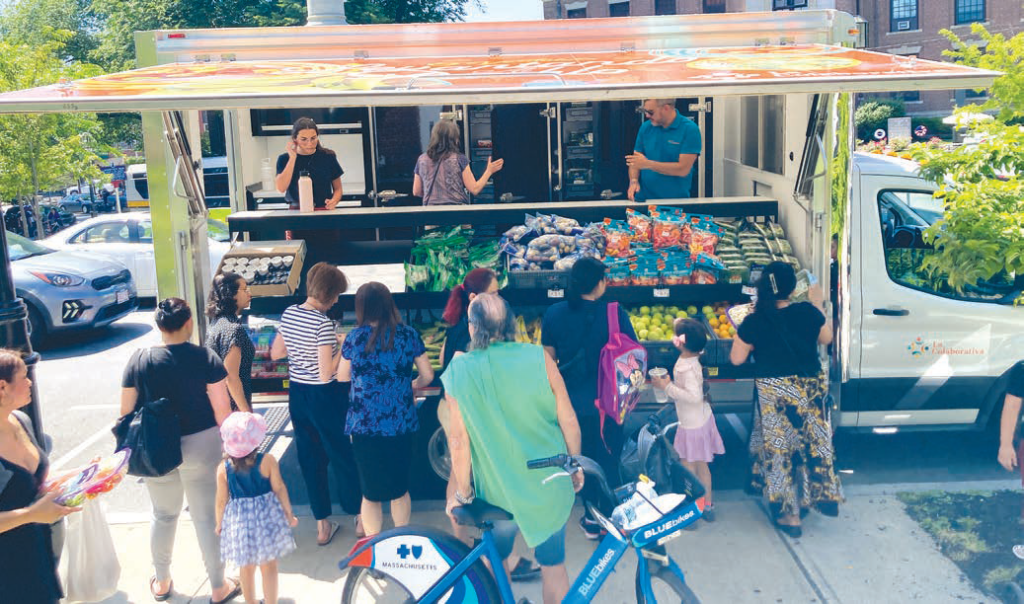Special to the Record
La Colaborativa, the preeminent Latina-led community organization in the Commonwealth, has been at the forefront of the fight for equitable food and nutrition access for decades. In connection with this mission, La Colaborativa is pleased to announce the launch of
“El Verdulero,” a brand new, refrigerated food pantry on wheels, which will swiftly deliver nutritious, culturally familiar foods to areas with scant food access, limited grocery stores, and high rates of underlying health conditions in Chelsea, Everett, Revere, and East Boston.

“Due to environmental injustice, communities like Chelsea face a dearth of grocery stores and soaring food prices, forcing residents to choose paying rent or feeding their families,” stated Alex Train, Chief Operating Officer. “We’re grateful to our partners at the USDA for enabling the launch of El Verdulero, allowing us to foster community and improve public health by bringing culturally familiar foods directly to our community in a vibrant new mobile market truck.”
Food insecurity is pervasive, especially in Environmental Justice communities. The availability, quality, and affordability of nutritious, culturally familiar foods determine whether residents experience high blood pressure, diabetes, and chronic health conditions. Magnified by climate change and deeply rooted poverty, BIPOC communities have been deprived of access. By bringing resources directly to community members, the initiative will focus on reducing food
insecurity, combating hunger, and building relationships between neighbors in ‘“food deserts” where local residents lack access to healthy grocery options, living wages, and supplemental food resources.
“In 2024, we have more than doubled the size of our Food and Nutrition Department, guided by Gladys’ vision of creating an innovative, centralized, and welcoming hub of food security
resources,” announced Camilo Saavedra, Director of Food and Nutrition. “El Verdulero will further our holistic approach to tackling widespread food insecurity, chronic health conditions, and environmental injustice by ensuring all residents, regardless of age, abilities, or income, have equitable access to food.”
The organization will share a monthly schedule of the truck’s route and hours of operation online, as well as through flyers distributed throughout the community. With the sound of salsa, merengue, and bachata, El Verdulero hopes to become an exciting weekly event that spreads joy and health in the community. The monthly schedule and distribution locations will target areas with significant rates of food insecurity and housing insecurity.
A study last month from the Greater Boston Food Bank revealed a worrying upward trend in food insecurity rates, while over 60% of residents of Chelsea report a lack of food access.
While the state is working to provide supplemental food resources such as SNAP and WIC, 80% of recipients of these benefits shared that these resources fell short of covering their basic food needs. Moreover, the lack of equitable public transportation options, rigid work schedules, double shifts, age, and mobility limitations all play a factor in limiting access to grocery stores and traditional food pantries.
With over 35 years of community organizing experience, La Colaborativa is no stranger to ambitiously facing a crisis head-on. At the start of the COVID-19 pandemic, the organization’s executive director Gladys Vega rallied the community to donate food and began distributing food from the porch of her own home. Through extraordinary efforts, this operation was expanded into what is now a bustling ‘Survival Center’ that not only distributes healthy culturally-
sensitive food to thousands of nearby residents every week, but also is home to a teaching kitchen, workforce development programs, youth programs, and health and nutrition initiatives. Although these programs have been a critical lifeline for the families that access them, the organization receives scores of weekly requests for deliveries to homebound residents and food distribution in areas with no comparable food programs in their vicinity.
